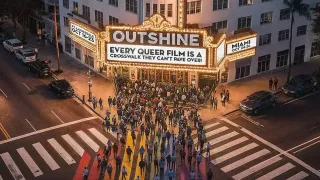May 9, 2015
Tenn. Marriage Equality Plaintiffs Get SF Welcome
Yael Chanoff READ TIME: 4 MIN.
On April 28, Valeria Tanco and Sophy Jesty were on the floor of the U.S. Supreme Court. Four days later, they were on the dance floor in San Francisco.
It was the annual party for the National Center for Lesbian Rights, and the two were celebrating their role in a Supreme Court case that could legalize same-sex marriage throughout the United States. Jesty and Tanco are plaintiffs in Tanco v. Haslam, one of the four marriage equality cases currently before the court.
And when they did go home to Tennessee after the whirlwind week in Washington, D.C. and San Francisco, that meant returning to a state that doesn't recognize their marriage.
Still, Jesty said she wasn't sure if she would be able to travel all the way to San Francisco for NCLR's anniversary gala after the oral arguments in D.C. She was convinced, she said, when NCLR Executive Director Kate Kendell asked, "How many lesbians need to be in the room for you to show up?"
Fifteen hundred people, mostly lesbians, attended the gala.
Two other Tennessee couples who are plaintiffs in Supreme Court marriage cases were honored along with Tanco and Jesty at the event.
"We got involved in this because we wanted to stand up for our family and for families like ours," said Tanco, who has a 2-year-old daughter with Jesty. When the process got tough, she said, "Our lawyers and everyone at NCLR made us feel safe, secure, and brave. They were like a fortress around us."
NCLR, which is headquartered in San Francisco, is a national legal organization. The group was founded in 1977 in response to an epidemic of cases in which lesbian mothers lost custody of their children based solely on sexual orientation.
Today, NCLR's work includes an immigration project for LGBT migrants, a campaign to end the practice of "conversion therapy" on queer youth, and a rural pride program in partnership with the U.S. Department of Agriculture.
In every effort, a few individuals become the public face representing whole classes of people. Kendell acknowledged the six Tennessee same-sex marriage case plaintiffs for "putting their lives on hold in many ways, making their lives very public."
They were "fantastic representatives of just people living their lives. Caring for each other, raising a child in one case, and simply seeking to have their relationship afforded the same dignity and recognition as anyone else," Kendell said.
That dignity may be a key factor in the Supreme Court decision. Justice Anthony Kennedy, whose vote will likely decide the case, has often invoked the concept of a legal right to dignity in his opinions, notably in the 2003 decision that invalidated sodomy bans and in the 2013 case that struck down a key provision of the Defense of Marriage Act.
Last Saturday, the plaintiffs told the Bay Area Reporter that they relate to the right to dignity argument in their personal lives.
"There are little things. Like filling out forms at a doctor's office. You have to make these little choices. Do you go with what the state says and call yourself single? Or do you do what you know is true, and fill out married?" said Thom Kostura, a plaintiff along with his husband, Ijpe DeKoe.
"Or a perfect stranger asking, 'Are you married?' Do you say yes? And then they say, 'What's her name?'" agreed Johno Espejo, another plaintiff along with his husband, Matthew Mansell.
"If you don't have equality under the law, how can you have dignity?" said Jesty.
Along with the plaintiff couples, their Tennessee-based attorneys - Abby Rubenfeld, Maureen Holland, and Regina Lambert - were also recognized by NCLR.
Madelynn Lee Taylor, also honored at the gala, has been similarly fighting for dignity. Taylor, a 75-year-old veteran, became a client of NCLR when her home state of Idaho refused to bury her late wife in the military cemetery, a right afforded to all spouses of veterans. With the help of NCLR lawyers, she won her case last year. Now, she's part of the "Add the Four Words" effort to get sexual orientation and gender identity added to the Idaho Human Rights Act - she's been arrested twice at sit-ins at the state Capitol.
"We won't give up, we won't stop, until we've got equality. It's not a matter of gay rights, it's not a matter of special rights. It's equal rights," Taylor said.
After dinner at the Marriott Marquis Hotel, guests celebrated across the street at a party in the City View room of the Metreon. Attendants played arcade games, got entertained by performers from Velocity Circus, inspired instant poetry by Silvi Alicivar of the poetry store, and the plaintiffs (and everyone else) hit the dance floor. Out singer Tracy Chapman even made an appearance.
But even as the group celebrated, Kendall emphasized that the work is far from over.
In the coming year, NCLR will join in on behalf of a Kansas mother who lost parental custody because she is supportive of her child's transgender identity. The organization will represent a trans man in Louisiana who was fired from his job because of his gender, and a mother in Washington state who lost custody of her child for being a lesbian - the same kind of case that inspired the founding of NCLR 38 years ago.
"There will be plenty to do," Kendell said. "And we can live with that reality at the same time that we celebrate our victories."






